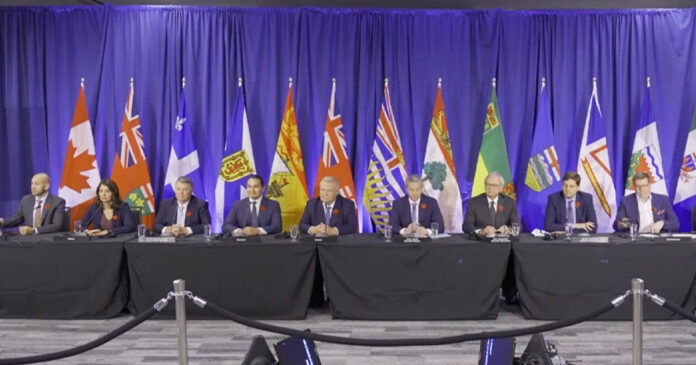Less than a year after making headlines for calling to “liberate Canada,” Tucker Carlson is coming here.
The former Fox News primetime personality, who now hosts a show on X (formerly Twitter), will be appearing on stage at Calgary’s Telus Convention Centre Jan. 24, joined by former Dragons’ Den star Brett Wilson and Alberta Premier Danielle Smith.
Everyone who donates to True North before the end of 2023 will be automatically entered into a draw to win a pair of FREE tickets!
Donate today to be automatically entered!
TP Events organizer Christian Darbyshire said Carlson is a big personality who always draws big crowds.
“We are excited to produce Tucker Carlson’s Calgary show. Tucker Carlson has become huge in pop culture and draws massive crowds wherever he goes,” Darbyshire told True North.
“His show on X garners tens of millions and sometimes hundreds of millions of views. Calgary will be an exciting addition for all his fans.”
Other A-list speakers hosted by TP Events include former US presidents Barack Obama and George W. Bush. The company has also hosted an event with former UK prime minister Tony Blair and former Alaska governor Sarah Palin.
Other speakers include Oprah Winfrey, Ellen Degeneres, Arnold Schwarzenegger and Stephen Hawking.
The lunch event will feature remarks by Carlson followed by a Q&A with him and Wilson and then a conversation between him and Smith.
More information can be found here.
Carlson has been highly critical of Canadian Prime Minister Justin Trudeau. At the height of the Covid-19 pandemic, Carlson took issue with Trudeau’s statement that high vaccination rates would not guarantee an end to lockdowns.
“The leader of Canada just explained on television that according to the science, the vaccine doesn’t stop Covid. Either the coronavirus shot works or it doesn’t, but the shot cannot be simultaneously highly effective, but not restore peoples’ lives to normal; that doesn’t make sense,” said Carlson.
While at Fox News, Carlson was also critical of the Trudeau government’s handling of the Freedom Convoy and how it ignored the various arson attacks against Canadian churches.
“All of a sudden, Canada looks a lot like the Soviet Union. Seems like we’re exaggerating a little bit but [leftist groups] are burning Catholic and Anglican churches in recent days,” Carlson said.
In April, Carlson released a documentary satirically questioning whether the United States should “liberate” Canada from tyranny as it did Iraq and Libya.



























